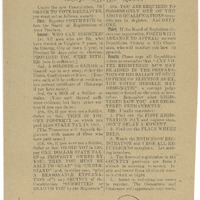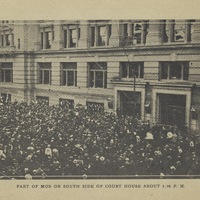 New Jersey Disfranchisement Statute (1807) New Jersey Disfranchisement Statute (1807) |
|
This New Jersey statute explicitly banned women and free people from color from voting, after these groups had been enfranchised since 1776. When New Jersey rewrote its constitution in 1844, it explicitly denied women and African Americans the right to vote.
|
 New Jersey Franchise Statute (1797) New Jersey Franchise Statute (1797) |
|
This New Jersey statute explicitly added women to their voting laws, while also allowing free people of color to vote. When New Jersey rewrote its constitution in 1844, it explicitly denied women and African Americans the right to vote.
|
 New York Charter of Liberties and Privileges (1683) New York Charter of Liberties and Privileges (1683) |
|
The New York Charter of Liberties and Privileges established the political organization of the colony of New York, set up election procedures, and guaranteed certain rights to colonists. This document created a democratic colony with the right to vote for the General Assembly given to "every freeholder within this province and freeman in any corporation." Extra protection is granted to Christians, although the document allows for religious freedom given practice does not "disturb the peace of the colony."
|
 Nixon v. Fitzgerald (1982) Nixon v. Fitzgerald (1982) |
|
In this case, the Supreme Court ruled that a president "is entitled to absolute immunity from damages liability predicated on his official acts."
|
 Noem v. Abrego Garcia (2025) Noem v. Abrego Garcia (2025) |
|
In this case, the Supreme Court agreed with a lower court's order for the government to "facilitate and effectuate" the return to the U.S. of Kilmar Armando Abrego Garcia who had been deported to El Salvador and detained in the Center for Terrorism Confinement.
|
 Noem v. Vasquez Perdomo (2025) Noem v. Vasquez Perdomo (2025) |
|
The Supreme Court's decision in this case allows federal agents to continuing using factors such as apparent race or ethnicity, spoken language or accent, presence at a specific location, and type of employment in conducting stops and making arrests.
|
 Northwest Ordinance (1787) Northwest Ordinance (1787) |
|
The Northwest Ordinance had important legal and political implications during the Early Republic. A key feature of the legislation was the recognition of tribal sovereignty and legal jurisdiction.
|
 Notice to Republican Voters of the 9th Congressional District of Virginia (1902) Notice to Republican Voters of the 9th Congressional District of Virginia (1902) |
|
This broadside publicized information about new voting laws and poll taxes in Virginia.
|
 Obergefell v. Hodges (2015) Obergefell v. Hodges (2015) |
|
In the landmark decision in Obergefell v. Hodges, the Supreme Court found that same-sex marriage was protected under the equal protection clause of the 14th Amendment.
|
 Of Colored Persons (1871) Of Colored Persons (1871) |
|
This act passed by the Virginia General Assembly reflects the race-neutral language of the legal code after the Civil War. Application of these statutes resulted in entrenched Jim Crow segregation.
|
 Of Masters and Apprentices (1887) Of Masters and Apprentices (1887) |
|
Acts passed by the Virginia General Assembly reflected race-neutral language of the legal code after the Civil War. Application of these statutes resulted in entrenched Jim Crow segregation.
|
 Oklahoma's Poor Rich Indians: An Orgy of Graft and Exploitation of the Five Civilized Tribes, Legalized Robbery (1924) Oklahoma's Poor Rich Indians: An Orgy of Graft and Exploitation of the Five Civilized Tribes, Legalized Robbery (1924) |
|
The introduction of Zitkala-Ša's groundbreaking report opened the scene on fraud facilitated by guardians, lawmakers, and county clerks at the expense of minors, heirs, and incompetents during early Oklahoma statehood, and focused on probate courts as a site of legal exploitation.
|
 Oliphant v. Suquamish Indian Tribe (1978) Oliphant v. Suquamish Indian Tribe (1978) |
|
In Oliphant v. Suquamish Indian Tribe, the court ruled that Native American tribes had no jurisdiction over non-Indians. The ruling was later overturned by the Indian Civil Rights Act and the ruling in Duro v. Reina that stated tribes had criminal jurisdiction over nonmember Indians. The case of Dollar General v. Mississippi Band of Choctaw Indians also held that tribes had jurisdiction over non-Indians.
|
 Omaha Grapples with its Ugly Past (2019) Omaha Grapples with its Ugly Past (2019) |
|
This article looks at the legacy of the lynching of Will Brown, featuring interviews with prominent, Black Omaha community members Preston Love and Ernie Chambers, as well as University of Nebraska-Omaha Urban studies professor, Barbara Hewins-Maroney.
|
 Omaha's Riot in Story & Pictures (1919) Omaha's Riot in Story & Pictures (1919) |
|
This series of photographs document the race riot in Omaha that culminated in the lynching of Will Brown in front of the Douglas County Courthouse. In the first, as many as 20,000 people gather outside an already damaged courthouse. In the second, white rioters smile around the remains of the police car they set ablaze. And in the third, federal troops guard the intersection of 24th and Lake streets, an area with a large number of Black homes and businesses.
|
 Opinion of Chief Justice Hornblower on the Fugitive Slave Law (1836) Opinion of Chief Justice Hornblower on the Fugitive Slave Law (1836) |
|
Justice Hornblower’s opinion in the State v. Sheriff of Burlington County called into question the authority of the Fugitive Slave Act. The opinion calls into question discrepancies between the federal law and state statute. This opinion is over the case of the Helmsley family. Alexander Helmsley and his wife, Nancy, were a free black couple living in New Jersey. Someone accused them of being fugitive slaves. Under the Fugitive Slave Act, the family should have been sent back to their former enslaver; however, New Jersey’s Personal Liberty Law protected them from being extradited from the state. Hornblower’s opinion advocated for following the state personal liberty law over following the federal law.
|
 Opinion of Judge Hays on Slavery in California (1856) Opinion of Judge Hays on Slavery in California (1856) |
|
In the decision in this case, a California judge ruled that Biddy Mason and her three children, as well as a woman named Hannah and her nine children and grandchildren, were "free forever" after their enslaver brought them into the free state of California to reside. The judge's opinion was published in the official newspaper of the American Anti-Slavery Society.
|
 Ozawa v. United States (1922) Ozawa v. United States (1922) |
|
The Supreme Court found in Ozawa v. United States that Japanese immigrants were not eligible for naturalization, based on a contested category of whiteness. The case considered the meaning of "free white persons" from the 1906 Naturalization Act and whether factors like assimilability should be considered. While the court determined in Ozawa that the words "white person" were meant to indicate a person of the "caucasian race," the decision in U.S. v. Thind just months later stated that the word "caucasian" was meant to refer to the "common understanding" of race and not a scientific one.
|
 Page Act (1875) Page Act (1875) |
|
The Page Act was a federal law that profiled Chinese and other women immigrating from Asian countries as immoral, barring them from entering the United States.
|
 Papachristou et al. v. City of Jacksonville (1972) Papachristou et al. v. City of Jacksonville (1972) |
|
In this case, the Supreme Court found that state and municipal vagrancy codes were too vague, resulting in their overturning.
|
 Paul Jones v. George W. Jones (1840) Paul Jones v. George W. Jones (1840) |
|
Paul Jones initiated a suit in a Wisconsin Territory court against George W. Jones for several sums of money owed to him for labor, goods, wares, and merchandise. George argued that Paul was purchased as a slave for life from French inhabitants who were entitled to hold slaves according to the Northwest Ordinance of 1787.
|
 Pensionado Act (1903) Pensionado Act (1903) |
|
This act, passed in the aftermath of the Philippine–American War, established a scholarship program for Filipino people to receive an education in the U.S.
|
 Peonage Act of 1867 Peonage Act of 1867 |
|
Following the passage of the 13th Amendment, this act officially abolished peonage, or debt slavery, in the United States. It specifically targeted New Mexico Territory, where this form of involuntary servitude was historically practiced. This act was later codified at 42 U.S.C. § 1994.
|
 People v. Belous (1969) People v. Belous (1969) |
|
This is a case before the California Supreme Court looking at abortion rights. It focused on a physician's ability to practice medicine unimpeded and the extent of physicians' abilities to determine when an abortion would be necessary to protect a woman's life.
|
 People v. Buffum (1953) People v. Buffum (1953) |
|
One of California's pre-Roe v. Wade abortion cases, the decision in Buffum attempted to regulate abortion tourism to Mexico. This case determined that California could not legislate medical practices in Mexico, causing an increase in abortion clinics across the border in Tijuana.
|
 New Jersey Disfranchisement Statute (1807)
New Jersey Disfranchisement Statute (1807) New Jersey Franchise Statute (1797)
New Jersey Franchise Statute (1797) New York Charter of Liberties and Privileges (1683)
New York Charter of Liberties and Privileges (1683) Nixon v. Fitzgerald (1982)
Nixon v. Fitzgerald (1982) Noem v. Abrego Garcia (2025)
Noem v. Abrego Garcia (2025) Noem v. Vasquez Perdomo (2025)
Noem v. Vasquez Perdomo (2025) Northwest Ordinance (1787)
Northwest Ordinance (1787) Notice to Republican Voters of the 9th Congressional District of Virginia (1902)
Notice to Republican Voters of the 9th Congressional District of Virginia (1902) Obergefell v. Hodges (2015)
Obergefell v. Hodges (2015) Of Colored Persons (1871)
Of Colored Persons (1871) Of Masters and Apprentices (1887)
Of Masters and Apprentices (1887) Oklahoma's Poor Rich Indians: An Orgy of Graft and Exploitation of the Five Civilized Tribes, Legalized Robbery (1924)
Oklahoma's Poor Rich Indians: An Orgy of Graft and Exploitation of the Five Civilized Tribes, Legalized Robbery (1924) Oliphant v. Suquamish Indian Tribe (1978)
Oliphant v. Suquamish Indian Tribe (1978) Omaha Grapples with its Ugly Past (2019)
Omaha Grapples with its Ugly Past (2019) Omaha's Riot in Story & Pictures (1919)
Omaha's Riot in Story & Pictures (1919) Opinion of Chief Justice Hornblower on the Fugitive Slave Law (1836)
Opinion of Chief Justice Hornblower on the Fugitive Slave Law (1836) Opinion of Judge Hays on Slavery in California (1856)
Opinion of Judge Hays on Slavery in California (1856) Ozawa v. United States (1922)
Ozawa v. United States (1922) Page Act (1875)
Page Act (1875) Papachristou et al. v. City of Jacksonville (1972)
Papachristou et al. v. City of Jacksonville (1972) Paul Jones v. George W. Jones (1840)
Paul Jones v. George W. Jones (1840) Pensionado Act (1903)
Pensionado Act (1903) Peonage Act of 1867
Peonage Act of 1867 People v. Belous (1969)
People v. Belous (1969) People v. Buffum (1953)
People v. Buffum (1953)